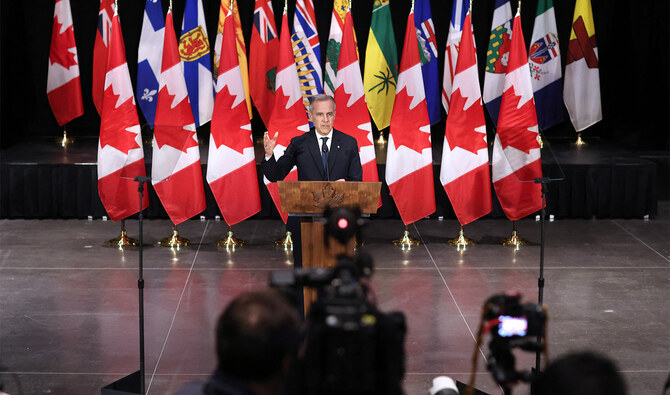OTTAWA: China and India are likely to try to interfere in the Canadian general election on April 28, while Russia and Pakistan have the potential to do so, the country’s spy service said on Monday.
The Canadian Security Intelligence Service (CSIS) made its comments at a time when Ottawa’s relations with both India and China are chilly. Beijing and New Delhi have denied previous allegations of interference.
Canada was slow in responding to efforts by China and India to interfere in the 2019 and 2021 elections but their outcomes were unaffected by the meddling, an official probe concluded in a final report released in January.
Vanessa Lloyd, deputy director of operations at CSIS, told a press conference that hostile state actors were increasingly leveraging artificial intelligence to meddle in elections.
“The PRC (People’s Republic of China) is highly likely to use AI enabled tools to attempt to interfere with Canada’s democratic process in this current election,” she said.
Earlier this month Beijing announced tariffs on more than $2.6 billion worth of Canadian agricultural and food products, retaliating against levies Ottawa slapped on Chinese electric vehicles and steel and aluminum products last year.
Canada said last week that China had executed four Canadian citizens on drug smuggling charges, and strongly condemned Beijing’s use of the death penalty.
Asked for a response to the CSIS comments at a regular news briefing on Tuesday, a Chinese foreign ministry spokesperson said China had always adhered to the principle of not interfering in the internal affairs of other countries, and had “never had any interest in interfering in Canada’s internal affairs.”
Canada last year expelled six Indian diplomats — including the head of mission — over allegations they were involved in a plot against Sikh separatists on Canadian soil.
“We have also seen that the government of India has the intent and capability to interfere in Canadian communities and democratic processes,” said Lloyd.
The Indian diplomatic mission in Ottawa was not immediately available for comment.
Russia and Pakistan could potentially conduct foreign interference activities against Canada, Lloyd added.
“It’s often very difficult to establish a direct link between foreign interference activities and election results ... Nevertheless, threat activities can erode public trust in the integrity of Canada’s democratic processes and institutions,” she said.
Canada says India, Pakistan among nations with potential to meddle in upcoming election
https://arab.news/jygwu
Canada says India, Pakistan among nations with potential to meddle in upcoming election

- Canada is set to hold general election on April 28 amid chilly relations with both India and China
- Its spy service says state actors are increasingly leveraging AI to meddle in electoral activities
Pakistan PM, Bangladesh chief adviser resolve to strengthen trade and cultural ties

- Pakistan and Bangladesh were once one nation, but split in 1971 as a result of a bloody civil war
- Ties between both nations have warmed up since PM Hasina’s ouster due to an uprising in August
ISLAMABAD: Pakistan Prime Minister Shehbaz Sharif and Bangladesh’s Chief Adviser Dr. Muhammad Yunus on Monday resolved to strengthen trade and cultural relations between the two countries, Sharif’s office said, amid a thaw in ties between the two countries.
The statement came after Sharif’s telephonic conversation with Yunus on Eid Al-Fitr in which they recalled their “productive” meetings in New York and Cairo on the margins of the United Nations General Assembly (UNGA) and D-8 summits last year.
The Pakistan premier expressed his satisfaction at the positive momentum in bilateral relations between the two countries, particularly in trade and travel, according to Sharif’s office.
“The two leaders reaffirmed their shared desire to further strengthen bilateral relations between Pakistan and Bangladesh,” it said in a statement.
“In this regard, the Prime Minister said that Pakistan looked forward to the visit of the Deputy Prime Minister/Foreign Minister to Dhaka in April and said that a trade delegation would also accompany him.”
Pakistan and Bangladesh were once one nation, but they split in 1971 as a result of a bloody civil war, which saw the part previously referred to as East Pakistan seceding to form the independent nation of Bangladesh.
In the years since, Bangladeshi leaders, particularly ex-PM Sheikh Hasina, chose to maintain close ties with India. Ties between Pakistan and Bangladesh have warmed up since Hasina’s ouster as a result of a student-led uprising in August, witnessing a marked improvement.
Pakistani cargo ships have begun to arrive at Bangladesh’s main Chittagong port for the first time since the 1971 war, while Pakistani artists have been performing in Dhaka and Bangladeshi films have been screened at cinemas in Pakistan since December.
During his conversation with Yunus, Sharif also underscored the need to revive institutional mechanisms to reinvigorate the bilateral relationship at all levels.
“Exchange of cultural troupes to promote people-to-people contact was also discussed,” Sharif’s office said. “The Prime Minister invited a Bangladesh cultural troupe, comprising old and new artists, including the legendary Runa Laila, to visit Pakistan.”
Northwestern Pakistani province orders probe into civilian deaths in drone attack

- Pakistani security forces carried out the strikes in Mardan district on Saturday, targeting alleged militant hideouts
- The Khyber Pakhtunkhwa provincial administration will never allow such actions in the future, government spokesman says
ISLAMABAD: The government in Pakistan’s northwestern Khyber Pakhtunkhwa (KP) province has ordered a probe into the deaths of 10 civilians in a drone attack last week, a provincial government spokesman said on Monday.
Ten bodies, including those of women and children, were recovered from a remote hilltop area of Katlang in KP’s Mardan district, where government officials claimed an anti-militant operation had taken place on Saturday.
The deceased hailed from the Swat region and were nomads with livestock in the Shamozai mountains, according to the locals. Their families protested the deaths by placing the bodies on the Swat Highway.
In a statement issued on Monday, KP government spokesman Muhammad Ali Saif said Chief Minister Ali Amin Gandapur had ordered an investigation into the tragic incident.
“After the facts come to light, the Khyber Pakhtunkhwa government will present its detailed stance in this regard,” he said, citing the chief minister. “The families of the martyrs will not be left alone under any circumstances and they will be provided with full financial assistance.”
CM Gandapur, whose Pakistan Tehreek-e-Insaf (PTI) is the main opposition party in the country that is in power in KP, noted that high-profile “terrorists” had previously been killed in the same area, according to Saif.
Pakistan has struggled to contain a surge in militancy in KP since a fragile truce between the Pakistani Taliban and Islamabad broke down in November 2022. The Pakistani Taliban and other militant groups have frequently targeted security forces convoys and check-posts, besides targeted killings and kidnappings of law enforcers and government officials in recent months.
Islamabad blames the surge in attacks on militants using Afghan territory as a base, particularly the TTP, which Pakistan says enjoys sanctuaries across the border. The Afghan Taliban-led government in Kabul denies this and accuses Pakistan in return of harboring Daesh militants.
Saif also said the federal authorities did not inform the provincial government about Saturday’s operation in advance, demanding a thorough analysis of operational aspects and identification of shortcomings in its execution.
“The provincial government will never allow such actions in the future,” he added.
Farshi Shalwar: Centuries-old staple of South Asian fashion makes Eid comeback in Pakistan

- Farshi shalwar is characterized by floor-length, flowing and wide, loose pants, creating a dramatic and graceful silhouette
- Stylists say trend dates back to the 17th century and was popular among noblewomen and courtesans of the Mughal era
KARACHI: A centuries-old staple of South Asian closets, the farshi shalwar, is back in Pakistan and ruling fashion trends this Eid Al-Fitr.
The word “farshi” comes from the Persian word “farsh,” meaning “floor,” and the farshi shalwar, particularly popular in Pakistan and northern India, is characterized by its floor-length, flowing and wide, loose pants, creating a dramatic and graceful silhouette.
“Right now, it’s the hottest trend,” fashion stylist and director Tabesh Khoja, popularly known as Khoji, told Arab News, saying he first styled a farshi shalwar in 2023 for the fashion label of model and actress Sadaf Kanwal.
“I styled Sadaf Kanwal actually and after that I have seen every other designer doing a farshi shalwar version of their own,” Khoja said.

No doubt, Kanwal seems to have played a key role in bringing the farshi shalwar back this Ramadan and Eid, with her label Sadaf Kanwal Fashion creating a number of outfits over the last two years featuring the baggy trousers.
“Throughout the [last] year, I shot so many collections of so many designers and all of those designers at least used to have two farshi shalwars for sure in their collections,” Khoja said. “So it took us an entire year to make it a fashion trend.”
According to the stylist, the trend dated back to the 17th century and was popular among noble women in the Mughal era. Modeled after the flowing gowns worn by British noblewomen, the complete outfit consists of three basic parts: a kurta or a long shirt, dupatta or long stole, and the third and most important, the farshi shalwar or pajama, a flowing two-legged trouser held by drawstrings that falls straight to the ankles from where it starts flaring and flowing copiously onto the floor, trailing as one walks.
In media, iconic movies such as Umrao Jaan (1981) and Shatranj Ke Khilari (1977) that depict Muslim culture of 19th-century Lucknow show noblewomen and royal courtesans wearing farshi shalwars.
“They had a variety of silhouettes in terms of a kurta or a jacket on top, among other things. The outfit has been there, the silhouette has been there since the 17th century but how you make it relevant now is very important,” Khoja added.

HOW TO STYLE A FARSHI SHALWAR?
According to Khoja, some of the popular ways to style the farshi shalwar include pairing it with a button down shirt and accessorizing it with different kinds of jewelry pieces and hairdos.
“You can dress it up or dress it down. Sadaf [Kanwal] uses big organza dupattas. You can do big shawls also like [actress] Mahira Khan wore [designer] Banto Kazmi’s when she got an award at the UK Parliament. So something of that sort also with a plain silhouette.”
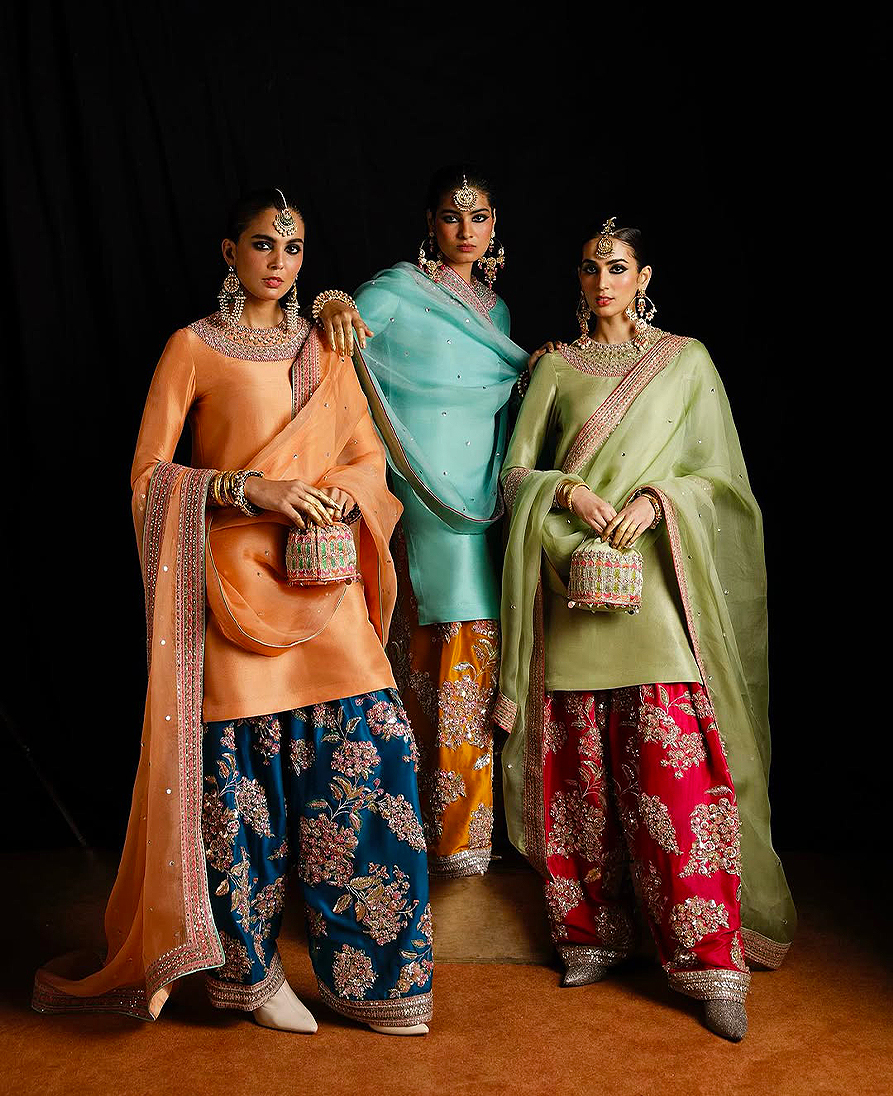
Pakistani actress Tuba Anwar said celebrities had been wearing farshi shalwars since last year but the trend had “peaked” among the general public in recent months. For her, the fact that everyone would be wearing the baggy trousers this Eid reduced their appeal.
“I was planning to wear farshi shalwar on this Eid and then when everybody started discussing it, I was like ‘No, this is not what I’m going to wear because I have to do something very different’.”
When she wore farshi shalwars at all, Anwar said she preferred them in solid colors.
“In terms of styling, I would like to wear it with solid colors, not a lot of embroidery going on, not a lot of things or abstract things going on in the clothes that I am going to wear,” she said.
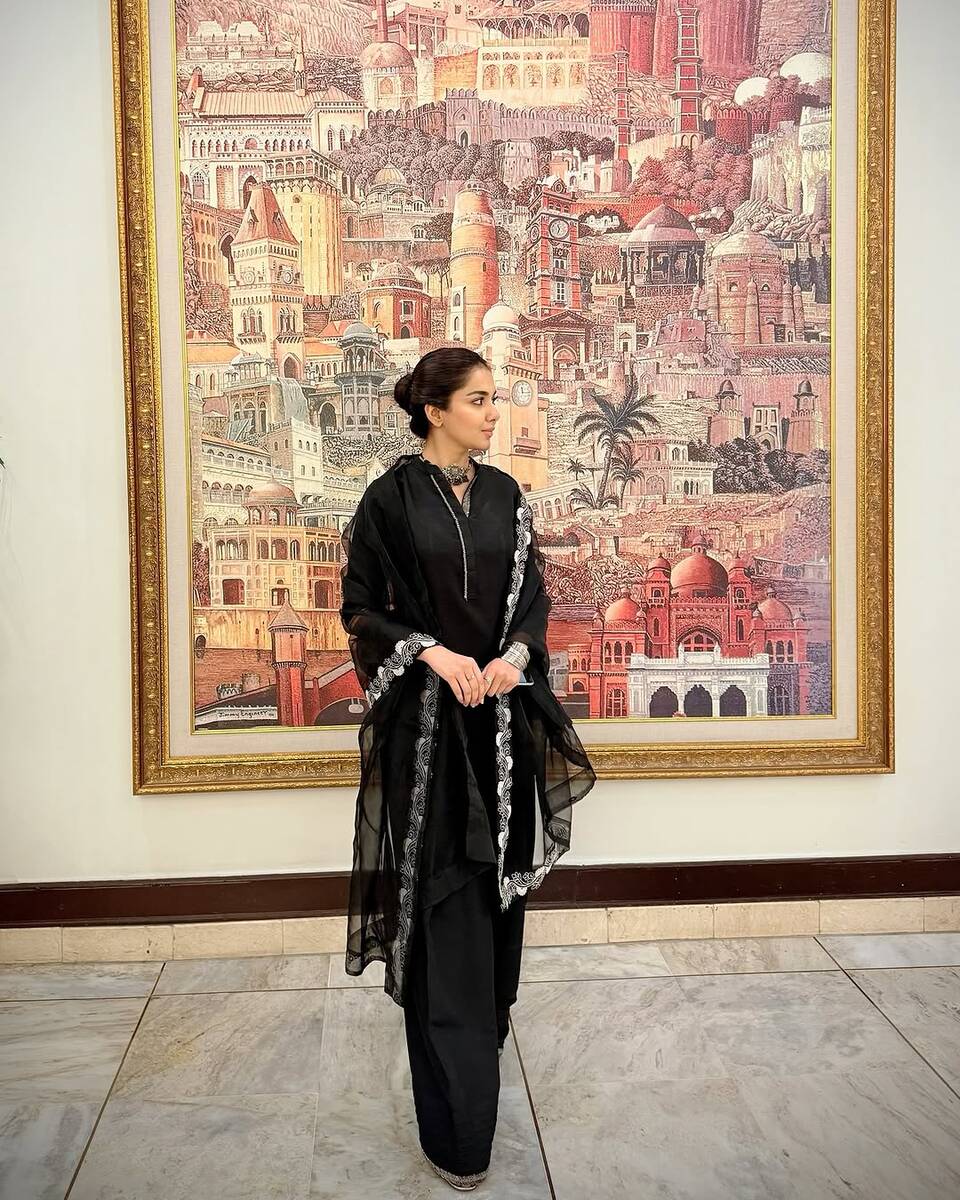
The farshi shalwar craze is not limited to women alone.
Actor and host Fahad Mustafa has donned the farshi shalwar look on his hit gaming show Jeeto Pakistan during Ramadan. Singer and songwriter Falak Shabbir has been seen in the outfit as well.
“It’s certainly not limited to women. Fahad Mustafa was of course wearing it on Jeeto Pakistan. I am going to wear it on Eid,” Khoja said. “So, you will see a lot of people of different sorts, male and female, wearing it.”

‘Who would feel like making new clothes?’: Bleak Eid for Afghans facing deportation from Pakistan

- Pakistan government has ordered Afghan Citizen Card holders to leave or face expulsion by Mar. 31, which falls on first day of Eid
- Ultimatum has left nearly 800,000 ACC holders grappling with the prospect of a forced return to a country many have never even visited
KARACHI: Until last year on the days before Eid Al-Fitr, the home of Zahra Arif, 20, used to be filled with laughter and the aroma of kulcha, qatlama, beef pulao and other traditional foods being prepared in anticipation of the religious holiday.
This year, the small apartment in which the family of ten lives on the outskirts of Pakistan’s megacity of Karachi was quiet and the air was tense. They are Afghan Citizen Card (ACC) holders, refugees granted temporary legal status in Pakistan in 2017 but whom the government ordered earlier this month to leave before Mar. 31 or face expulsion — a date that coincides with the first day of Eid this year.
“We haven’t made any preparations for this Eid because the situation is uncertain,” Arif, who was born and raised in Karachi and whose family has lived there for 35 years, told Arab News.
“They are expelling Afghans so who would feel like making new clothes for Eid?”
The move is part of a larger repatriation drive of ‘illegal foreigners’ that began in 2023, with over 884,261 Afghans expelled from Pakistan since, according to government figures. Authorities initially said they were first focusing on expelling foreigners with no legal documentation and other categories like ACC holders would be included later.
More than 800,000 Afghans hold an ACC in Pakistan, according to UN data. Another roughly 1.3 million are formally registered with the Pakistan government and hold a separate Proof of Residence (PoR) card, launched in 2006 to grant legal recognition and protection to Afghan refugees. In total, Pakistan has hosted over 2.8 million Afghan refugees who have crossed the border during 40 years of conflict in their homeland.
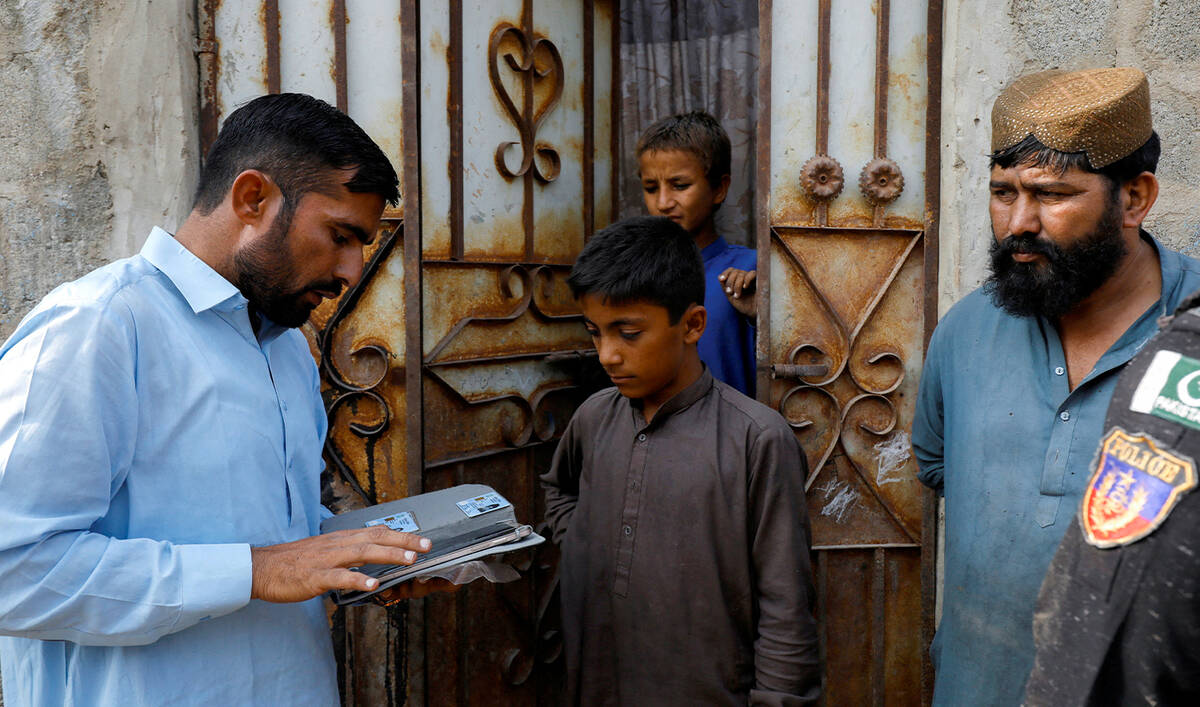
Islamabad has in the past blamed militant attacks and crimes on Afghan citizens, who form the largest portion of migrants in the country. The government says militants, especially from the Pakistan Taliban (TTP), are using safe havens in Afghanistan and links with Afghans residing in Pakistan to launch cross-border attacks. The ruling administration in Kabul has repeatedly rejected the accusations.
The latest deadline has left the nearly 800,000 ACC holders, including an estimated 65,000 in Karachi, grappling with the prospect of a forced return to a country many have never even visited.
“We have been living here for 30 to 35 years, how will we survive there,” said Arif, whose family comprises her parents, two brothers, five sisters, and herself. “There is no place for us there, no home, nothing.”
“EID HAS TURNED INTO POISON”
Arif also has other worries.
She fears for the career and higher education prospects for herself and her five sisters in Afghanistan, where over three years of Taliban rule has led to the “striking” erasure of women from public life, according to the UN.
Afghanistan is the only country in the world where secondary and higher education is strictly forbidden to girls and women. According to UNESCO data published last year, 1.4 million Afghan girls have been deliberately deprived of schooling. Access to primary education has also fallen sharply, with 1.1 million fewer girls and boys attending school.
Since the Taliban took power in 2021, professional opportunities for women have also been severely restricted. Many women lost their jobs and others were only allowed to continue if they worked from home. Any woman who still has a job has to be accompanied on their journey to work by a male relative.
Arif, who completed her high-school in Karachi, had dreams of pursuing a career in IT but now believes all her efforts were in vain.
“I have taken computer courses and was thinking of doing a freelancing course but how will I do that there?” she asked. “The twelve years of education I completed here, my intermediate degree, everything will be useless there.”
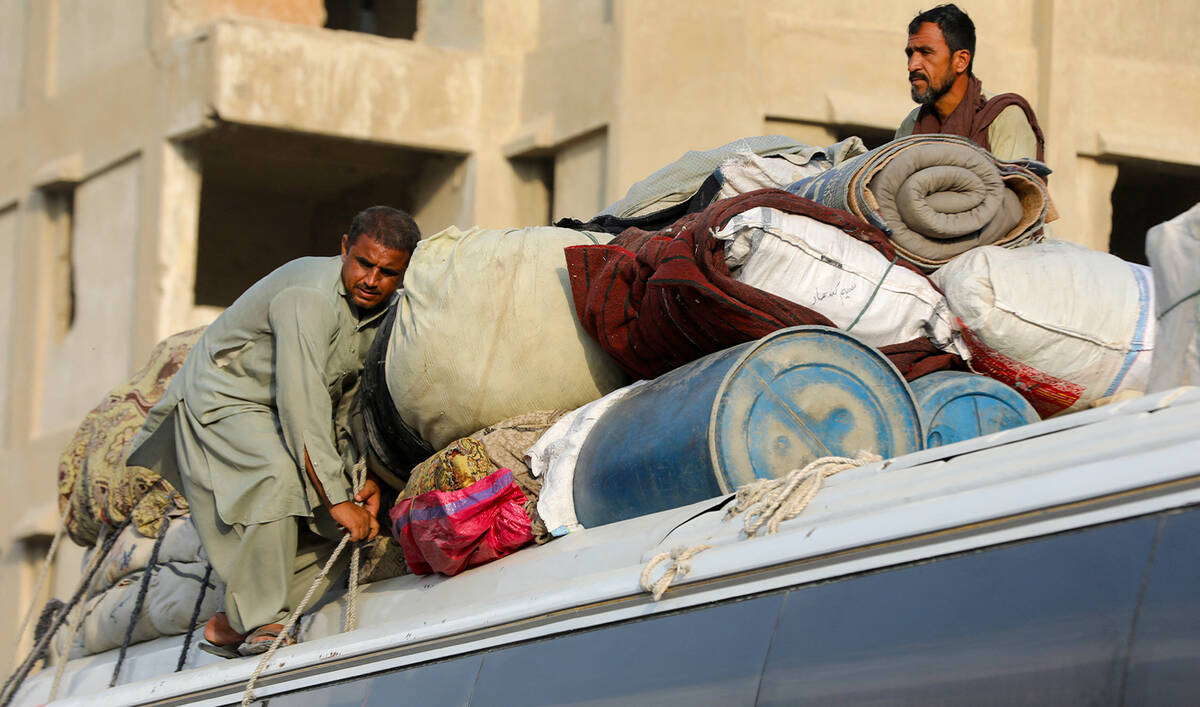
Idrees Khan, a 25-year-old Afghan refugee who was born in Pakistan and sells French fries at a roadside stall, also wondered what he would do in Afghanistan, a country he has never visited and where he had heard there were few jobs and future prospects.
“For us, Pakistan has always felt like our country but now, on Eid, they are telling us to leave. This is distressing,” he said. “If they had given us some time to process and prepare, it would have been better for everyone. But forcing us to leave now is inappropriate.”
Hajji Abdullah Shah Bukhari, a community elder who represents Afghan refugees in the southern Sindh province, said he was “still in shock” over the government’s decision to expel ACC holders.
“Pakistan has hosted Afghan refugees for 47 years and we are grateful for this hospitality, but the recent announcement of expelling us is heartbreaking.”
The government’s decision was taking an “emotional toll” on the community ahead of the Eid holiday, the community leader said.
“A year ago, around this time, people would be buying clothes and essentials for their children to celebrate Eid,” he said. “But now, if you look inside any Afghan household, you will see people shedding tears of blood, wondering what to do.”
Bukhari urged Islamabad to reconsider its policy and engage with Afghan authorities on any issues between the two governments.
“Why doesn’t the Islamic Republic of Pakistan negotiate with the Islamic Emirate of Afghanistan?” he asked. “Afghan refugees are not involved in the policies of either Afghanistan or Pakistan. We have always remained away from politics, but what is happening to us now is injustice.”
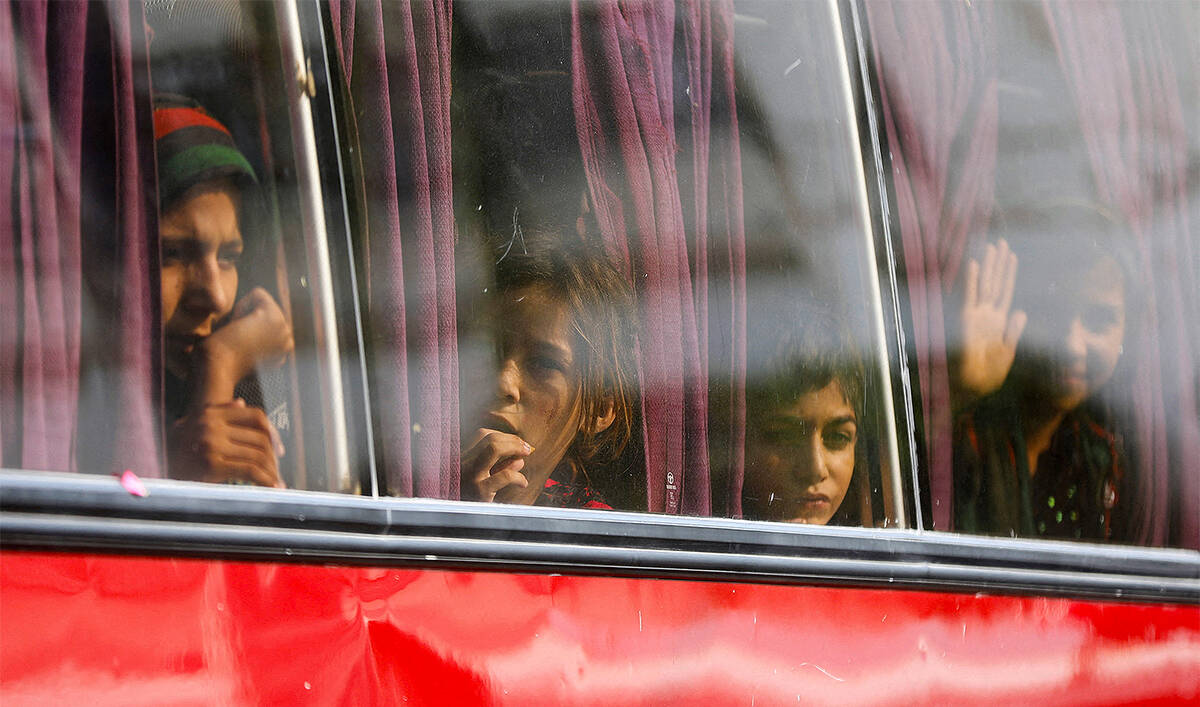
The United Nations High Commissioner for Refugees (UNHCR) also expressed concerns.
“We have seen and are aware of the [Pakistani] government’s plans regarding ACC holders,” Qaiser Khan Afridi, a UNHCR spokesperson in Pakistan, told Arab News.
“UNHCR is concerned regarding the latest directive, as among the Afghan Citizen Card-holders there may be individuals requiring international protection.”
Afridi called for a humanitarian approach and urged dialogue between Pakistan and Afghanistan:
“It is imperative that returns are voluntary and dignified so that reintegration in Afghanistan is sustainable.”
A statement from the government on Sunday said “no mistreatment will occur during the [repatriation] process,” adding that arrangements had been made for food and health facilities for those returning.
But amid the fear and uncertainty, Gul Jan, a 53-year-old refugee with 11 children and an ailing husband, pleaded for compassion from the authorities.
“This Eid has now become a sorrow for us, it has turned into poison,” she said. “But if the government’s word changes now, then any regular day will be Eid for us.”
On Eid Al-Fitr, Pakistan PM demands world end rights violations in Gaza

- In Pakistan, the day dawned with special congregational prayers at mosques and Eidgahs
- PM Shehbaz Sharif calls for national unity to defeat militancy and achieve economic stability
ISLAMABAD: Prime Minister Shehbaz Sharif on Monday voiced his support for the Palestinian people and demanded the world stop human rights violations in Gaza, Sharif’s office said, as Pakistanis marked Eid Al-Fitr.
The three-day Eid Al-Fitr festival starts on the first day of the month of Shawwal in the Islamic lunar calendar. The festival marks the end of the holy fasting month of Ramadan.
In Pakistan, the day dawned with special congregational prayers at mosques and Eidgahs nationwide, with people praying for peace, progress and security of Pakistan and the Muslim world.
In his message on Eid, Sharif said it is a day of joy, gratitude, brotherhood and compassion, and the people of Pakistan must remember their brothers and sisters, especially the oppressed people of Palestine, on the occasion.
“Pakistan always stands with them and will always be,” he said. “The international community should stop human rights violations and provide relief to these innocent Muslims.”
Pakistan, which does not recognize Israel, has consistently called for a cessation of hostilities in Gaza, where Israel’s war has killed more than 48,000 Palestinians since Oct. 2023 attacks by Hamas on Israel.
The South Asian country has dispatched several aid consignments for the war-torn Palestinian people and demands an independent Palestinian state based on “internationally agreed parameters” and pre-1967 borders.
Sharif said Pakistan was currently facing threats from both internal and external enemies and called for national unity to foil any conspiracy against the country.
“We must avoid all kinds of extremism, hatred and sectarianism,” the prime minister urged. “We should unite and lead our country on the path of development and prosperity.”
In his message, President Asif Ali Zardari urged the nation to remember their brothers and sisters, who were less privileged on this joyous occasion, saying the real happiness of Eid lies in sharing the joys with others.
“This day also teaches us the lesson of unity and solidarity, that we should unite in our ranks, support each other and play our role in taking Pakistan on the path of progress and prosperity,” Zardari said. “We have to promote brotherhood among ourselves so that our country emerges as a strong and prosperous state.”
Pakistan’s military services chiefs and the chairman of the Joint Chiefs of Staff Committee also congratulated the nation on Eid Al-Fitr, urging the nation to stand united amid a surge in militancy in the South Asian country.
“Eid Al-Fitr, marking the conclusion of Ramadan, stands as a symbol of unity, compassion, and gratitude. For our soldiers, the true essence of Eid is embodied in the honor of defending our cherished nation— even in separation from family— while striving to foster peace, prosperity, and harmony,” said the Inter-Services Public Relations (ISPR), the military’s media wing, citing the top brass.
“In the spirit of Eid, the Armed Forces of Pakistan call upon all citizens to unite under the banner of love, respect, and solidarity, the very principles that define our great nation.”


